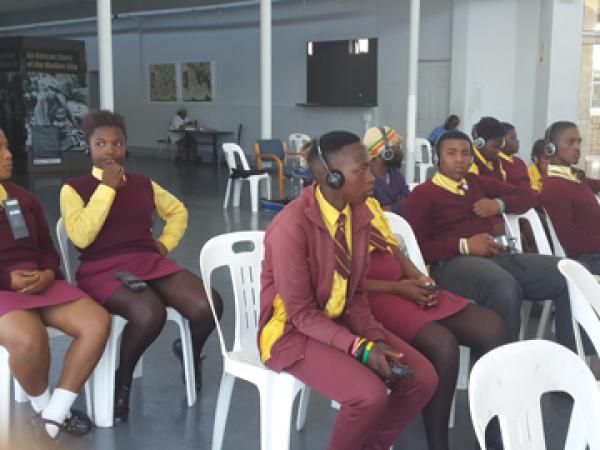City and SJC dispute over Commission

The City of Cape Town and the Social Justice Coalition (SJC) have locked horns over the scope of the Khayelitsha Commission of Inquiry and the role of the City in the quality of policing.
The cause of the conflict is the interpretation of the terms of reference of the Commission. The City argues that the terms are narrow and the Inquiry must be confined to the role of SAPS. The SJC argues that inadequate service delivery in Khayelitsha puts people at risk of crime which puts SAPS under greater pressure. An example of this is the long distance people often have to walk to toilets, at night without adequate lighting. SJC members have described in the past how they have been assaulted doing this.
The SJC therefore put forward questions to be asked of the City at the Commission, but these were excluded. On Tuesday this week, Mayor Patricia De Lille wrote:
…the City has noted with concern that there is a clear strategy on behalf of certain groupings, most notably the Social Justice Commission, to try and shift the blame for the policing inefficiencies of the South African Police Services (SAPS) to the City. It must be made explicitly clear that the City’s policing role is limited to by-law and traffic enforcement, and that our service delivery mandate is not linked to the policing role of the SAPS.
The terms of reference of the commission are very clear. They are focused on assessing the inefficiencies of the SAPS in Khayelitsha. We will continue to monitor developments at the commission to ensure that no party is allowed to blur this distinction and confuse the public as to who is constitutionally responsible for policing: the SAPS, and not the City.
The Social Justice Coalition (SJC) responded the next day:
The dire lack of services and infrastructure in Khayelitsha impacts directly on the most basic rights to dignity and security of the person … the O’Regan/Pikoli Commission of Inquiry has heard that residents of Khayelitsha’s informal settlements lack the most basic of services and experience disproportionately high levels of crime and violence. This testimony is quite contrary to the claims made by Mayor de Lille in her statement on 4 February 2014 … People are robbed, beaten, raped and murdered simply while trying to relieve themselves.
This severe deficit in services and infrastructure not only creates an environment where residents are vulnerable to crime, but also places a burden on police resources and contributes to inefficiencies within the South African Police Service (SAPS).
The purpose of the questions [that were excluded from the Commission] was to develop a better understanding of various aspects of safety and security in Cape Town.
Ensuring safety and security in Khayelitsha and elsewhere will require that all stakeholders – including the City – acknowledge and carry out their respective mandates.

A woman and child watch proceedings at the Khayelitsha Commission of Inquiry. Photo by Adam Armstrong.
The SJC argues that entities such as the Metro Police, the Anti-Land Invasion Unit provide services in Khayelitsha which affect the performance of SAPS in Khayelitsha. In the initial documents the SJC submitted to Premier Helen Zille calling for the Commission, they laid complaints against the Anti-Land-Invasion as well as other entities that have been excluded from the terms of reference.
The Commission is in its third week now. Up until Tuesday the City had been silent throughout the proceedings. On Thursday we heard from the its key deponent, Richard Bosman, who is the City’s Executive Director.
Bosman, whose testimony was led by the City’s advocate, Anton Katz, said that he would be unable to comment on SAPS’s performance or on service delivery broadly in the City, as well as various other aspects of the Commission. He said that his role and the role of the City at the Commission is to assist and cooperate. Interestingly, Advocate Nazreen Bawa, who appeared irritated with Bosman proceeded to ask him some of the questions that the SJC had put forward anyway.
Behind this dispute it is important to remember the complex politics. The Social Justice Coalition, which has been critical of all three spheres of government, campaigned for the Commission. The Commission was instituted by Ms Zille who leads the Provincial DA-led government. Its terms of reference are confined to SAPS, which is the responsibility of the ANC-led national government. The national Minister of Police unsuccessfully instituted court action to try to prevent the Commission from proceeding. In that court case the SJC partly supported the provincial government by arguing for the Commission to proceed. But it was also dissatisfied that the terms of reference were so narrow.
The Terms of Reference of the Commission are specified in Section 206(5) of the Constitution, and they are narrow. They allow for an investigation into “allegations of police inefficiency in Khayelitsha and a breakdown in relations between the community and the Police in Khayelitsha”. It is possible that The City, and its various service-provision bodies, fall outside the scope of this constitutional clause. Neverhtheless, the SJC’s broader focus on safety beyond policing will likely be more helpful to the residents of Khayelitsha.
Support independent journalism
Donate using Payfast


This article is licensed under a Creative Commons Attribution-NoDerivatives 4.0 International License.
